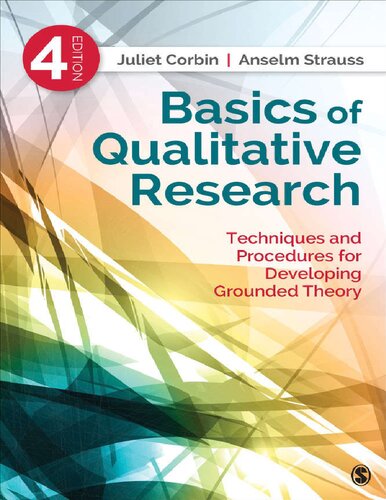

Most ebook files are in PDF format, so you can easily read them using various software such as Foxit Reader or directly on the Google Chrome browser.
Some ebook files are released by publishers in other formats such as .awz, .mobi, .epub, .fb2, etc. You may need to install specific software to read these formats on mobile/PC, such as Calibre.
Please read the tutorial at this link. https://ebooknice.com/page/post?id=faq
We offer FREE conversion to the popular formats you request; however, this may take some time. Therefore, right after payment, please email us, and we will try to provide the service as quickly as possible.
For some exceptional file formats or broken links (if any), please refrain from opening any disputes. Instead, email us first, and we will try to assist within a maximum of 6 hours.
EbookNice Team

Status:
Available0.0
0 reviews
ISBN 10: 1412997461
ISBN 13: 9781412997461
Author: Juliet Corbin, Anselm Strauss
Offering immensely practical advice, Basics of Qualitative Research, Fourth Edition presents methods that enable researchers to analyze, interpret, and make sense of their data, and ultimately build theory from it. Authors Juliet Corbin and Anselm Strauss (late of the University of San Francisco and co-creator of grounded theory) walk readers step-by-step through the research process—from the formation of the research question through several approaches to coding, analysis, and reporting. Packed with definitions and illustrative examples, this highly accessible book concludes with chapters that present criteria for evaluating a study, as well as responses to common questions posed by students of qualitative research. New end-of-chapter "Insider Insights" contributed by qualitative researchers give readers a sense of what it’s like to work in the field. Significantly revised, this Fourth Edition remains a landmark volume in the study of qualitative methods.
Chapter 1. Inspiration and Background
Overview
Qualitative Research
Description of Qualitative Research
Explanation of Why Researchers Choose Qualitative Over Quantitative Methods
Grounded Theory Methodology
Brief History of Grounded Theory Methodology
Unique Features of Grounded Theory Methodology
Types of Data
Analysis of Data
Testimonials From Our Students Regarding Grounded Theory
They Enjoy the Mental Challenge
They Are Open and Flexible
They Hope That Their Work Has Relevance Beyond Academia
There Is Complete Absorption in the Work
Grounded Theory Is an Important Methodology
Grounded Theory Offers Explanations
Why Choose Grounded Theory Methodology?
Difference Between Description and Theory
Description
Theory
Ethics
Participants
Research
Researcher
Chapter 2. Theoretical Foundations
Pragmatism and Philosophy of Knowledge
The Creation of Knowledge
The Relationship Between Problematic Situations and Reflective Inquiry
Temporal Aspects of Thinking and Process
The Relationship Between Knowing and Culture
Experience as Integral to Inquiry
The Cumulative Nature of Knowledge
The Usefulness of Knowledge as a Basis for Action
Beyond the Practical
Summary
Worldview: A Combination of Dewey and Mead
Ontology: Assumptions About the World
Assumptions That Lie Behind the Way Strauss Interpreted Data
Impact of Recent Trends on This Methodology
Influences
The Gap Between Writing About and Doing Analysis
Nature of “Reality”
Theories Are Constructions
Concepts Are the Foundation for Knowledge
Practical Application of Knowledge
The Need for Self-Reflection
Ethics in Relation to Pragmatism and Interactionism
Chapter 3. Practical Considerations for Getting Started
The Research Problem
Advisor or Mentor
Technical and Nontechnical Literature
Personal and Professional Experience
Pilot Projects
The Research Question
Defining Issues
Framing the Research Question
Writing the Proposal
Other Related Points
Data Collection
A Research Journal
Sources of Data
Interviews
Observations
Issues When Doing Observations
Important Considerations Before Beginning Data Collection
Committees and Institutional Review Boards
Interview and Observational Guides
Informed Consent
Confidentiality and Anonymity
Researcher Responsibilities
Perspectives, Biases, and Assumptions
Researcher Biases and Assumptions
Strategies for Controlling Intrusion of Perspectives, Biases, and Assumptions
Differing Opinions
The Literature
The Technical Literature
The Nontechnical Literature
Theoretical Frameworks
Justifying Choice of Methodology or Approach
Building Upon a Research Program
Offering Alternative Explanations
Chapter 4. Prelude to Analysis
Aims of Research
Description
Conceptual Ordering
Theory
The Nature of Qualitative Analysis
Analysis Is an Art and a Science
Analysis Involves Interpretation
Analysts Are Interpreters and Conveyors of Meaning
More Than One Theory Can Be Derived From Data
Concepts Form the Basis of Analysis
There Are Different Levels of Analysis
Analysis Is a Process
Analysis Begins With the Collection of the First Pieces of Data
Early Analysis Is Generative
Delineating Context Is an Important Aspect of Analysis
Analysts Make Use of Analytic Tools to Carry Out Analysis
Microanalysis
The Value of Microanalysis
Misconceptions About Microanalysis
Microanalysis Complements More General Analysis
Example of Microanalysis
The Logic of Grounded Theory Analysis
Concepts Form the Structure of Theory
Concepts Vary in Levels of Abstraction
Sensitivity
The Nature of Sensitivity
Influence of Professional Knowledge and Experience
Professional Knowledge and Experience Can Enhance Sensitivity
Sensitivity Grows Over the Course of the Research
Sensitivity Is Important in Cross-Cultural Research
Ethics
Insider Insights: Grounded Theory Research
the basics of qualitative research
fundamentals of qualitative research a practical guide pdf
basics of qualitative research
basic qualitative research examples
qualitative research facebook
using facebook for qualitative research a brief primer
Tags: Juliet Corbin, Anselm Strauss, Qualitative, Techniques